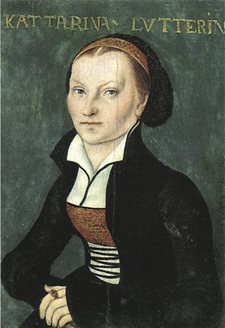 Katharina was born in 1499 into a family that was part of the nobility but that had fallen into financial hardship. Her mother died when she was young and her father sent Katharina away to be educated in a Benedictine convent. When she was 10 year’s old, he made arrangements for her to become a nun at the rather spartan Cistercian convent in Nimbschen, 25 miles to the east of Leipzig, a move possibly motivated by financial constraints. There, as a teenager, Katharina committed herself to a life of poverty, chastity, and obedience.
Katharina was born in 1499 into a family that was part of the nobility but that had fallen into financial hardship. Her mother died when she was young and her father sent Katharina away to be educated in a Benedictine convent. When she was 10 year’s old, he made arrangements for her to become a nun at the rather spartan Cistercian convent in Nimbschen, 25 miles to the east of Leipzig, a move possibly motivated by financial constraints. There, as a teenager, Katharina committed herself to a life of poverty, chastity, and obedience.
Nuns on the run
Despite its isolation, Katharina and some of the other nuns got hold of Luther’s writings and were impacted by his critique of monasticism. They wrote to the reformer, seeking his assistance on how they might leave the cloister. Release from the convent would require a papal dispensation and escape was a punishable offence.
A plan was formulated in which a local merchant, Leonhard Koppe, who was a supplier to the convent, would smuggle them out. In April 1523, under cover of darkness, 24-year-old Katharina was one of around 10 nuns who escaped in Koppe’s fish wagon.
The fugitive nuns were brought to Luther in Wittenberg. Luther promptly set about playing the role of matchmaker and before long it seemed that Katharina had found love in Jerome Baumgartner, a young man from Nuremberg – they talked of marriage, however this was not to be.
Two years passed and Katharina was still unmarried. Luther tried to set up a match with a nearby minister in his 60s, but she refused and, instead, effectively asked Luther to be her husband.
All eyes were now on Luther. He had, after all, helped bring about a reformation in the way in which marriage was understood, arguing that marriage was honourable and necessary (apart from for those people called to singleness). Despite this, he confided to a friend, “according to my present form of mind I have no intention of marrying.”
A marriage to ‘rile the pope’
Luther was conflicted. He preached about the goodness of marriage as a divinely ordained gift – no longer a less spiritual path than clerical celibacy. Yet, despite encouraging others to marry, he would not marry. However, his thinking was about to change. In what was perhaps the least romantic reason ever given for choosing to marry, Luther determined that he would do so to “please his father, rile the pope, cause the angels to laugh and the devils to weep.”
Nevertheless, Luther was determined to practise what he preached and so would marry out of principle and mutual esteem. It appears that he had simply no idea of how love would blossom and bear fruit in their marriage.
They married on the day that he proposed, 13th June 1525. It was a small ceremony: Martin and Katharina, four guests and the local pastor. Not all were impressed, and some of Luther’s closest colleagues feared that it would distract him from his God-given calling. Nonetheless, there were public festivities and feasting in Wittenberg a fortnight later when the marriage was consecrated.
 Rev. Dr. Martyn Cowan is Lecturer in Historical Theology at Union Theological College, Belfast.
Rev. Dr. Martyn Cowan is Lecturer in Historical Theology at Union Theological College, Belfast.
This blog is based on an article that first appeared in the April 2017 edition of the Presbyterian Herald. Part 2 is available here. You can also read A brief guide to Luther (Part 1 and Part 2) by Professor Laurence Kirkpatrick, as part of this series on the Reformation.
Faith at the crossroads is a special celebration of the 500th anniversary of the Reformation. There will be three opportunities to share in this free celebratory event – 17th October in Dublin, 18th October in Londonderry and 19th October in Belfast.